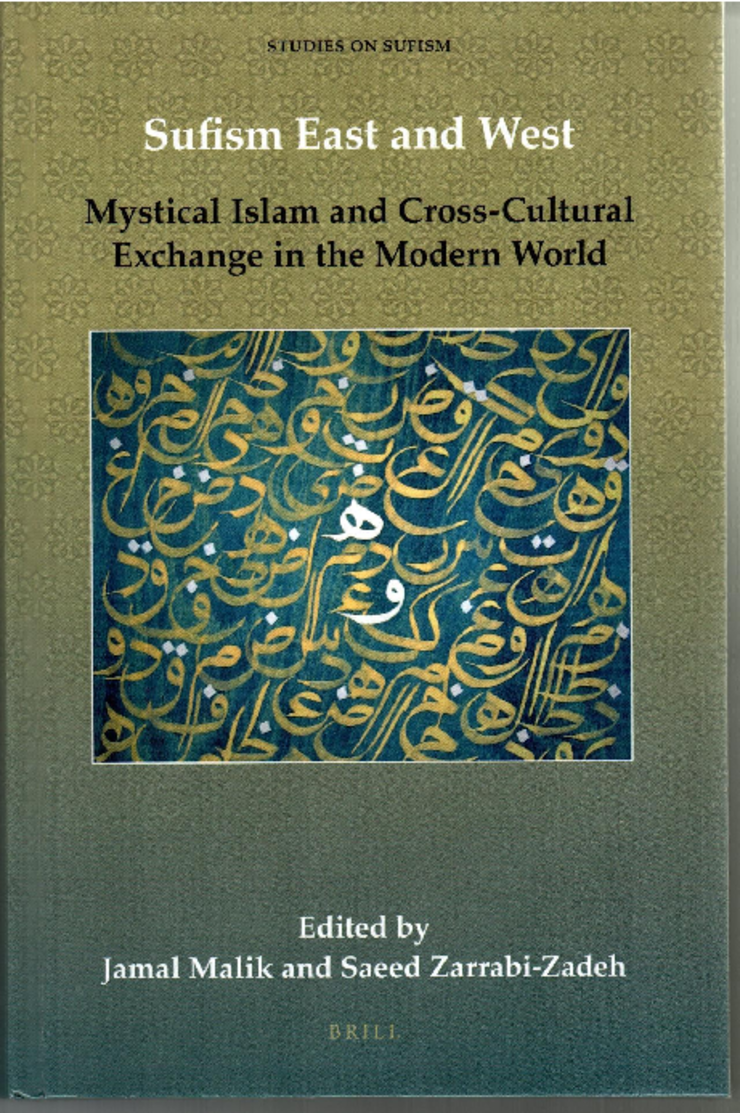Sufism East and West: Mystical Islam and Cross-cultural Exchange between the West and the Muslim World
International Workshop in Memory of Professor Annemarie Schimmel (1922–2003) 15–17 April 2016, University of Erfurt, Germany
Sponsored by
- German Research Foundation (DFG), University of Erfurt
Organizers
- Jamal Malik, Saeed Zarrabi-Zadeh
Invited speakers
- Carl Ernst (University of North Carolina at Chapel Hill, USA)
- Alexander Knysh (University of Michigan, USA / St. Petersburg State University, Russia)
- Philip Valentini (University of Fribourg, Switzerland)
- Jamal Malik (University of Erfurt, Germany)
- Rachida Chih (Centre national de la recherche scientifique [CNRS], France)
- Itzchak Weismann (University of Haifa, Israel)
- Mark Sedgwick (Aarhus University, Denmark)
- Marcia Hermansen (Loyola University Chicago, USA)
- Saeed Zarrabi-Zadeh (University of Erfurt, Germany)
- Ali S. Asani (Harvard University, USA)
- Catharina Raudvere (University of Copenhagen, Denmark)
- Marta Dominguez-Diaz (University of St. Gallen, Switzerland)


Rationale
Sufism, the major trend of Islamic mysticism, has become increasingly visible in Western contexts during the last two centuries. Sufi texts were translated from Islamic languages into European languages, Sufi orders (ṭarīqas) and their branches expanded into Euro-American spaces, and significant religious and social movements have been inspired by Sufi principles. Such a vibrant presence of Sufism in the West has undoubtedly influenced European and American cultural and academic discourse. Yet, the interaction between Muslim majority and Western cultures through Sufism is not limited to such tangible impacts, nor is the cross-cultural exchange between the two contexts confined to the unilateral influence of one upon the other. This interrelation is also not limited to the realm of religion and spirituality. It is rather a multi-dimensional, reciprocal interchange, a dialogue between the West and the Muslim world, in which Sufism functions, among other elements, as a vehicle of distinction, self-definition and self-criticism as well as an instance of the repositioning of religion in the age of globalization.
This international specialist workshop aims to investigate the complex cross-cultural interchanges between the West and the Muslim world through the medium of Sufism by means of analyzing and examining the parallel and reciprocal processes and counter-movements between the two cultural realms. It will highlight the crucial role played by Sufism in this interchange while scrutinizing the significance of Sufism in such an entanglement as seen in the amendments, adaptations and expansions that the Sufi semantic itself underwent as a result of such extensive interactions within and across the two disparate contexts of the West and the Muslim world. Such investigation challenges the enduring Orientalist binary coding of unilateral European expansion and cultural domination versus non-European passivity or resistance during their historical encounters in modern times.
Annemarie Schimmel, in whose memory this event is being held in his birthplace, is a pivotal example of those Westerners who engaged, throughout her long career, in promoting East-West cultural exchange via Sufism. Through voluminous and influential studies on mystical Islam and her translation of Sufi texts, she served as a conduit for the Sufi presence in the West. At the same time, the warm reception of Schimmel and her works by Muslims is indicative of the influential presence of western scholarship on Sufism in the Muslim world. The University of Erfurt preserves a major part of her academic estate, including some 4,400 volumes of her private library as well as the complete collection of all of her prizes, medals and certificates (Vitrine 9: Bibliothek Annemarie Schimmel). During the workshop, some significant items from her estate will be exhibited in the university library, many of them for the first time.
Program
15.04.2016 (Fr)
15:00-16:00 Opening of the exhibition of Prof. Schimmel’s estate (at the university library, Poster)
16:30-17:00 Registration, workshop opening
17:00-17:30 Coffee break
17:30-20:30 Panel 1: Western Constructions of Sufism
17:30-18:30 – Carl Ernst: "The Dabistān and Orientalist views of Sufism"
18:30-19:30 – Alexander Knysh: "What’s in a name? How definitions of Sufism have become a
meeting place of ‘creative imaginations’ and polemical partis-pris"
19:30-20:30 – Philip Valentini: "Dismantling Michel Valsan’s Akbarian Islam: A Lacanian reading of
westernized Sufism"
16.04.2016 (Sat)
10:00-13:00 Panel 2: Dynamics of the Perception of Sufism in the Modern Muslim World
10:00-11:00 – Jamal Malik: "Sayyid Ahmad Khan’s Tahdhīb al-Akhlāq and Sufic amnesia"
11:00-12:00 – Rachida Chih: "Debating Sufism East and West: Fazlur Rahman and
the Ṭarīqa Muḥammadiyya.
A new historiographical outlook"
12:00:13:00 – Itzchak Weismann: "Roots of Islamism: ‘Abd al-Rahman al-Kawakibi on the
corruption and correction of Sufism"
13:00-14:30 Lunch break
14:30-17:30 Panel 3: Historical Interactions between Sufism and Western Culture
14:30-15:30 – Mark Sedgwick: "Gurdjieff and Sufism: Sources and impacts"
15:30-16:30 – Marcia Hermansen: "The negotiation of Eastern and Western themes and narrative
in Western Sufi autobiographies"
16:30-17:30 – Saeed Zarrabi-Zadeh: "Sufism in the modern West: Trajectories, typologies, and
engagements with Western modernity"
17.04.2016 (Sun)
09:00-12:00 Panel 4: Sufism and Islam in the Western Context
09:00-10:00 – Ali S. Asani: " 'God is Beautiful and loves beauty': Fostering literacy about Islam
through the arts"
10:00-11:00 – Catharina Raudvere: "Contemporary Sufism in Bosnia: Claims of authenticity and authority"
11:00-12:00 – Marta Dominguez-Diaz: "Between two or three worlds: Reversion to Islam,
marocanité and Western Sufism in the ṭarīqa Būdshīshiyya"
12:00 -13:00 Round up
13:00 -14:00 Lunch break
14:00-19:00 Trip to Weimar / Buchenwald

